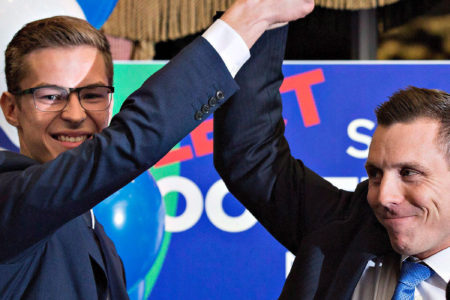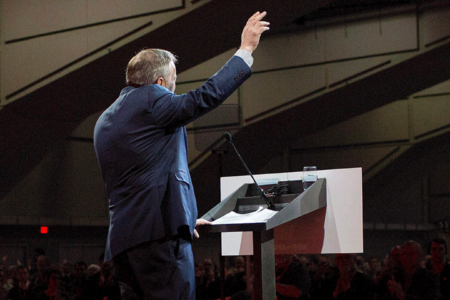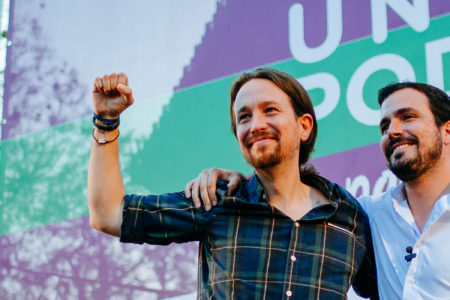
Pourquoi? Why? Why invest so much time and effort in this party? I have sometimes asked myself that question, and you probably have too. Well, the easy answer is because we believe in democratic socialism. But the real question is: What is democratic socialism? The philosopher would say that it’s an ideology of collective responsibility and common good. The professor of political science would say that it is a set of government policies. The activist would say that it is about defending specific issues or groups, or challenging the current social order. The union member would say that democratic socialism is about defending workers’ rights. The Opposition MP would say that it is about attacking the right wing agenda in Parliament.
All of these assumptions are true. But they are missing the basic idea. And that is that democratic socialism is, in Michael Harrington’s words, before anything else, a hope. It is the hope of humankind for a fair, fraternal and free future.
So the next time someone asks you “why?”. You tell ‘em, ”Why? This is why! Because this is our hope!”
Mais si nous voulons porter cet espoir, nous devons changer. Certaines personnes dans le Parti croient que nous pouvons continuer avec la même vision, le même discours, les mêmes stratégies, et que, par magie, nous allons avoir plus de succès. Je ne suis pas un de ceux-là. Je me suis lancé dans cette course pour contribuer à bâtir un parti socio-démocrate crédible et gagnant, à travers tout le pays.
Today, I want to propose the five keys to renewing our party and building that real alternative. Because, to have the results you never had, you must do what you have never done.
The first key for renewal is vision. In the last years, the Left has been in a defensive position: the discourse of the NDP has been essentially to protect the heritage of the welfare state. This was not a bad thing, but it has put the NDP in a position of reaction. How did we allow this to happen? It’s very simple, and the Right understands this! The goal of a political party, especially on the Left, is not to react ”in the present” to the political agenda set by others, but to impose the themes, the questions, to set the political agenda of the future. We should not try to surf the waves created by the Right: we must create our own waves. We must present our vision. Our vision must not be the one of the radical Left, one that criticizes but has nothing credible to propose. But our vision should not be to move to the Center.
So, I’m proposing a vision that I like to call pragmatic radicalism. It means that we should be clear…that the society we dream of, a society of justice, equality and co-operation, is radically different than the one proposed by the corporate agenda. We must present a youthful and optimistic vision while proposing concrete and feasible policy. Because to be truly radical, one must make hope possible, rather than despair convincing.
The second key to renewal is a new perspective on the economy. We need to regain credibility on economic issues. But that does not mean that we should move to the Right. So let’s talk about economic democracy: giving power back to people and to communities over the levers of the economy. Nous avons besoin d’une nouvelle vision de l’économie, une qui vise le plein-emploi par une économie mixte; une vision ou l’État a un rôle mais ou on vise aussi à redonner du pouvoir aux gens et aux communautés. Bref, nous avons besoin d’une économie démocratique. Parce qu’il ne peut pas y avoir de démocratie politique sans démocratie économique.
Pour faire face aux nouvelles technologies et aux transformations dans le milieu de travail, nous avons besoin d’une politique de partage du temps de travail. Pour créer de l’emploi et pour se développer autrement, nous avons besoin d’offrir plus de soutien aux coopératives et au développement économique communautaire. Pour diversifier notre économie, particulièrement en régions, et pour donner plus de pouvoir aux gens, nous avons besoin de créer des Fonds coopératifs d’investissement local, sous contrôle des communautés. Pour donner plus de pouvoir aux travailleurs, nous devons favoriser la syndicalisation, donner un plus grand rôle aux Fonds syndicaux et proposer des programmes de participation des travailleurs dans leur milieu de travail. Pour respecter nos engagements face à l’environnement et développer de nouveaux secteurs, nous devons créer un vaste Fonds de recherche et d’investissement dans les technologies vertes. Pour s’assurer que les corporations reconnaissent leurs responsabilités face à la société et non seulement face à leurs actionnaires, nous devons exiger qu’elles produisent un bilan social. Pour réduire le pouvoir des banques sur nos vie, nous devons lutter contre l’endettement étudiant et l’endettement à la consommation. Enfin, pour continuer à éliminer la pauvreté, nous avons besoin d’implanter un revenu universel de citoyenneté.
All these examples show ways by which we can fight the incredible concentration of economic power in the hands of a few, and build “slowly, yet surely” those real alternatives to global corporate capitalism. This must be our mission. Our current economic system creates very few winners, and a lot of losers. And it is not enough to simply redistribute income from the former to the latter. So why can’t we imagine a system where we could all be winners? Our challenge, as social democrats, is not imply to better redistribute wealth. Our challenge is to show how we can create wealth differently.
This idea of economic democracy has been at the heart of my campaign. I am proposing a vision which says that economic institutions should not only be controlled either by big business or by the state, but should also be controlled by civil society in a way that is participatory, decentralized and democratic. The alternative to free-market capitalism is not to nationalize everything, but it is to build a worker-owned, community-controlled, co-operative market. That is the alternative.
La troisième clé du renouvellement du NPD est une nouvelle ouverture au Québec. Il ne peut y avoir un parti ou un mouvement social-démocrate fort au Canada sans la participation de la gauche québécoise. Si nous voulons représenter une vraie alternative au gouvernement libéral, nous devons bâtir partout au pays et notamment auprès des francophones.
Aujourd’hui, je veux proposer un contrat de solidarité entre la gauche québécoise et la gauche cana- dienne. Je tends la main aux électeurs du Parti québécois, du Bloc, de l’UFP, de la gauche du Parti libéral, et aussi à ceux qui ne votent pas. Et je tends la main aux syndicats, aux groupes communautaires, et aux mouvements sociaux du Québec. Ensemble, nous pourrons bâtir un Canada différent; un fédéralisme coopératif avec un gouvernement fédéral moins arrogant qui respecte ce qui existe déjà dans les provinces et qui négocie avec elles de bonne foi; et, enfin, un fédéralisme asymétrique pour reconnaître la nation québécoise et les défis qui lui sont propres.
Nous ne pouvons pas nous diviser éternellement sur la question constitutionnelle : il y a trop d’enjeux auxquels il faut s’attaquer. C’est seulement ensemble que nous pourrons présenter une alternative à l’agenda néo-libéral au Canada.
Today, I am proposing a Contract of Solidarity between the Quebec Left and the Canadian Left. And Quebecers must make a step in the NDP’s direction. But the NDP must also do what it takes to build in Quebec. Because there can be no strong and united Left in Canada without the support of Quebec’s social democrats. I am committed to this goal and I hope you are too.
La quatrième clé est de travailler dans l’intérêt de tous les citoyens. Vous savez, en politique, on tombe souvent bien vite dans le jeu de la division. Les centres urbains d’un côté et les régions de l’autre. Les jeunes d’un côté et les babyboomers de l’autre. Les anglophones d’un côté et les francophones de l’autre. Les hommes et les femmes. Les blancs, les immigrants et les autochtones. Les travailleurs syndiqués et les non-syndiqués. La classe moyenne et les pauvres.
Or, la gauche n’a pas d’avenir si elle ne peut pas présenter une vision qui pourra rallier une majorité.
My friends, the Left must not fall in the trap of sectarianism. That would only allow the Right to take control of the political agenda, pretending to speak for “ordinary people.” So our politics must be politics of solidarity: between regions, between sexes, between cultures, between generations. I believe that we can be left wing and be mainstream at the same time. There is no contradiction.
…Workers unemployed women LGB youth the elderly linguistic, cultural and religious communities… We are not simply a bunch of minorities! Together, we are the overwhelming majority of Canadians. And the day we understand this is the day that we will boldly go where no New Democrat has gone before: from being the social conscience of the country to being the socially conscious government of this country!
The fifth key to renewal is to be clear on our goal as a party. If I’m leader…When I’m leader, I will propose a plan to Council with the objective of bringing the NDP to government in 10 years.
Ten years is the amount of time we will need to set a new political agenda and to build everywhere in the country. It’s also the amount of time it will take to recruit not only good candidates, but outstanding ministers in a first NDP cabinet. Viser à former un gouvernement, ce n’est pas qu’un slogan: c’est une obligation morale. Pour que nous puissions être dans une position ou nous pourrons implanter les choses qui nous tiennent à cœur.
We can do it. But the first step that we must take is to start believing that we can. We will set a different agenda for this country. We will present a radical, optimistic and pragmatic vision. We will propose real economic alternatives. We will give power back to our members. Nous allons bâtir une vaste coalition de citoyens et de groupes. Nous allons bâtir au Québec. We will consolidate where we are strong, and build where we are not. We will open our doors to a new generation. And when we have done all of that, then we will take Parliament by storm and not dream of, but build a society of equality, justice and solidarity.
Before I conclude, I want to salute my partners in this race. We need all of them in this party.
We need Lorne’s strength on economic issues and his commitment to forming government; Jack’s ability to organize, to build coalitions and his understanding of urban issues; Bill’s passion and experience in Parliament; Bev’s strong voice for feminism and a worker’s agenda; and Joe’s strategy for winning more ridings and his discreet, yet profound, sense of conviction.
And we need a leader that will bring this party together and build on the strengths of all.
And whatever happens today, I will continue to be a team builder because I am committed to democratic socialism in Canada and to the party!
There is so much potential for this party. But we have a lot of work to do. Some say about this party what others have said about my own campaign: “They don’t have enough money, not enough media attention, and no chance of winning. These guys have a few good ideas, but besides that, they don’t have much.” Well, let me say to you, my friends, that we have, all of us, we have everything we need if we have nothing but our hope.







